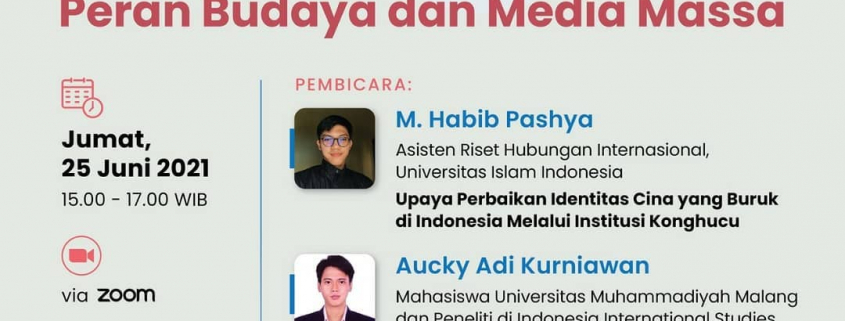[RECAP] Beyond the Great Wall #15: Transforming Perceptions about China: The Role of Culture and Mass Media
On Friday (25/06), the Institute of International Studies UGM held the 15th edition of Beyond the Great Wall Forum, titled “Transforming Perceptions about China: The Role of Culture and Mass Media.” In this edition, BTGW was held online via the Zoom Meetings platform and invited two speakers. First, M. Habib Pashya, an assistant researcher of the International Relations department in Universitas Islam Indonesia, presented “Efforts to Improve China’s Bad Reputation in Indonesia through the Confucian Institute.” The second speaker is Aucky Adi Kurniawan, a student from Universitas Muhammadiyah Malang and researcher in Indonesia International Studies Academic Utilization Community, who presented “The Role of Chinese and Western Mass Media in Framing the Uyghur Conflict.” The moderator for this discussion was Indrawan Jatmika, staff of the Research Division in IIS UGM.
Whether it is in Indonesia or at the global level, people’s perception of China is often dominated by doctrines constructed from the West—which lens has been focused on China’s negative side. Responding to this, China is not staying still. Pashya stated that China had been actively engaging with cultural diplomacy since the Cold War era through his presentation. This is because China realizes that China’s political and economic power was relatively weak at the time. China’s cultural diplomacy is enforced through various programs, such as student exchange programs, international events such as the Beijing Olympic of 2008, social campaigns through mass media and radio, international aid such as the Belt and Road Initiative, and by establishing the Confucian Institute in countries all around the world. The Confucian Institute is aimed to promote the Mandarin language and Chinese culture globally. Right now, there are about 500 Confucian Institutes in almost 140 countries—including Indonesia. In Indonesia, the existence of the Confucian Institute has spread massively, especially after Confucianism is recognized as one of the state’s religions during Gus Dur’s presidency. The cultural, diplomatic strategy through the Confucian Institute is done along with the worsening of China’s reputation in Indonesia, especially with the stigmatization against communism and events such as the G30S and the 98 crisis. Essentially this strategy succeeds in bringing a more positive image about China in Indonesia—especially with the emergence of various collaborations with several universities and Muslim organizations. However, in 2019, negative perceptions about China rise significantly because of the Uyghur conflict, problems in the South China Sea, and the COVID-19 pandemic.
Focusing on media studies, through his presentation, Aucky explained that basically, “who controls the media, controls the world.” This is what Aucky calls the key behind China’s vigorous efforts in a media campaign, using media as a tool to fix its political image—especially about the Uyghur conflict. The Uyghur conflict has a long and extensive history; it is a minority ethnic group based in Xinjiang, often depicted by Western media as victims of genocide done by the Chinese government. There are many reports about the existence of concentration camps in Xinjiang intentionally built by the Chinese government to brainwash the Uyghur minorities to become supporters of the Chinese Communist Party (CCP). As a response, the CCP, through the Global Times, a media corporation under its wing, released several news reports framing the Uyghur conflict as a separatist movement. Hence, the Chinese government needs to take serious actions against such threats. Framing is done by publishing stories and news such as “Allegedly Missing Uyghurs Found Living Normally,” indicating that the Uyghur minority in China live normally—the total opposite of Western media reports. Such news is also used to counter stories published by media such as the New York Times, a media company under the wing of the US government, such as “Inside China’s Push to Turn Muslim Minorities into an Army of Workers.” Using the theoretical framework of constructivism and framing model analysis in journalism, Aucky stated that it is evident how mass media is used as a political instrument and a tool for propaganda, both by China and the West, especially regarding the politicization of the Uyghur problem.
Writer : Brigitta Kalina
Editor : Mariola Yansverio




Leave a Reply
Want to join the discussion?Feel free to contribute!